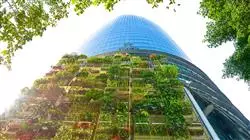University certificate
Accreditation/Membership
The world's largest faculty of engineering”
Introduction to the Program
Un programa exhaustivo y 100% online, exclusivo de TECH y con una perspectiva internacional respaldada por nuestra afiliación con The Sustainability Alliance”

La sociedad moderna vive en un momento en el que la adaptación al Cambio Climático comienza a priorizarse sobre una cada vez más compleja mitigación. Esto cobra aún más sentido teniendo en cuenta que más del 55% de los ciudadanos del mundo residen en ciudades, cifra que la ONU espera que ascienda a dos tercios de cara a 2050.
Esta futura situación será realmente problemática si no preparamos las infraestructuras urbanas ante la diversa índole de desastres que la comunidad científica vaticina que acontecerán. En esta misión, las grandes protagonistas serán las infraestructuras verdes, que se posicionan como el motor de cambio y el tapón de eventos extremos. Para la creación y diseño de estas Infraestructuras Resilientes, serán imprescindibles ingenieros y arquitectos con conocimientos actualizados en la materia. Esta titulación preparará a estos profesionales para que tengan éxito en esta área de gran proyección. En esta línea, el Postgraduate certificate analizará la relación entre la Salud Pública y la exposición al Medio Natural para trasladar modelos saludables a las ciudades. Asimismo, se examinará en profundidad los elementos de la infraestructura verde que se desarrollarán en el futuro para promover la reintegración de las urbes con la naturaleza.
Además, los alumnos disfrutarán desde casa de esta alta preparación y dispondrán de facilidades como el acceso las 24 horas del día a una completa biblioteca de recursos digitales. Lo único que necesitarán para especializarse en este campo con todas las garantías es una conexión a Internet.
Asimismo, gracias a que TECH es miembro de The Sustainability Alliance, el profesional contará con materiales especializados, guías y ejercicios para el diseño de programas de desarrollo sustentable. Adicionalmente, podrá asistir a eventos académicos, recibir descuentos en publicaciones y conectarse con una red internacional de investigadores, reforzando el conocimiento sobre sostenibilidad y ampliando su proyección profesional en contextos globales exigentes.
Conviértete en el ingeniero que redefina la relación de las ciudades con la naturaleza”
Este Postgraduate certificate en Infrastructures for Urban Resilience contiene el programa educativo más completo y actualizado del mercado. Sus características más destacadas son:
- El desarrollo de casos prácticos presentados por expertos en Infraestructuras Resilientes
- Los contenidos gráficos, esquemáticos y eminentemente prácticos con los que está concebido recogen una información técnica y práctica sobre aquellas disciplinas indispensables para el ejercicio profesional
- Los ejercicios prácticos donde realizar el proceso de autoevaluación para mejorar el aprendizaje
- Su especial hincapié en metodologías innovadoras
- Las lecciones teóricas, preguntas al experto, foros de discusión de temas controvertidos y trabajos de reflexión individual
- La disponibilidad de acceso a los contenidos desde cualquier dispositivo fijo o portátil con conexión a internet
Accede sin límites a la biblioteca de recursos digitales más completa sobre Infraestructuras Resilientes”
El programa incluye, en su cuadro docente, a profesionales del sector que vierten en esta capacitación la experiencia de su trabajo, además de reconocidos especialistas de sociedades de referencia y universidades de prestigio.
Su contenido multimedia, elaborado con la última tecnología educativa, permitirá al profesional un aprendizaje situado y contextual, es decir, un entorno simulado que proporcionará una capacitación inmersiva programada para entrenarse ante situaciones reales.
El diseño de este programa se centra en el Aprendizaje Basado en Problemas, mediante el cual el profesional deberá tratar de resolver las distintas situaciones de práctica profesional que se le planteen a lo largo del curso académico. Para ello, contará con la ayuda de un novedoso sistema de vídeo interactivo realizado por reconocidos expertos.
Profundiza en tus conocimientos y conviértete en el ingeniero en Infraestructuras Resilientes que demandan los Gobiernos y grandes entidades privadas"

Lidera uno de los grandes Objetivos de Desarrollo Sostenibles de la ONU para proteger a los ciudadanos mediante Infraestructuras Resilientes"
Why study at TECH?
TECH is the world’s largest online university. With an impressive catalog of more than 14,000 university programs available in 11 languages, it is positioned as a leader in employability, with a 99% job placement rate. In addition, it relies on an enormous faculty of more than 6,000 professors of the highest international renown.

Study at the world's largest online university and guarantee your professional success. The future starts at TECH”
The world’s best online university according to FORBES
The prestigious Forbes magazine, specialized in business and finance, has highlighted TECH as “the world's best online university” This is what they have recently stated in an article in their digital edition in which they echo the success story of this institution, “thanks to the academic offer it provides, the selection of its teaching staff, and an innovative learning method aimed at educating the professionals of the future”
A revolutionary study method, a cutting-edge faculty and a practical focus: the key to TECH's success.
The most complete study plans on the university scene
TECH offers the most complete study plans on the university scene, with syllabuses that cover fundamental concepts and, at the same time, the main scientific advances in their specific scientific areas. In addition, these programs are continuously being updated to guarantee students the academic vanguard and the most in-demand professional skills. In this way, the university's qualifications provide its graduates with a significant advantage to propel their careers to success.
TECH offers the most comprehensive and intensive study plans on the current university scene.
A world-class teaching staff
TECH's teaching staff is made up of more than 6,000 professors with the highest international recognition. Professors, researchers and top executives of multinational companies, including Isaiah Covington, performance coach of the Boston Celtics; Magda Romanska, principal investigator at Harvard MetaLAB; Ignacio Wistumba, chairman of the department of translational molecular pathology at MD Anderson Cancer Center; and D.W. Pine, creative director of TIME magazine, among others.
Internationally renowned experts, specialized in different branches of Health, Technology, Communication and Business, form part of the TECH faculty.
A unique learning method
TECH is the first university to use Relearning in all its programs. It is the best online learning methodology, accredited with international teaching quality certifications, provided by prestigious educational agencies. In addition, this disruptive educational model is complemented with the “Case Method”, thereby setting up a unique online teaching strategy. Innovative teaching resources are also implemented, including detailed videos, infographics and interactive summaries.
TECH combines Relearning and the Case Method in all its university programs to guarantee excellent theoretical and practical learning, studying whenever and wherever you want.
The world's largest online university
TECH is the world’s largest online university. We are the largest educational institution, with the best and widest online educational catalog, one hundred percent online and covering the vast majority of areas of knowledge. We offer a large selection of our own degrees and accredited online undergraduate and postgraduate degrees. In total, more than 14,000 university degrees, in eleven different languages, make us the largest educational largest in the world.
TECH has the world's most extensive catalog of academic and official programs, available in more than 11 languages.
Google Premier Partner
The American technology giant has awarded TECH the Google Google Premier Partner badge. This award, which is only available to 3% of the world's companies, highlights the efficient, flexible and tailored experience that this university provides to students. The recognition as a Google Premier Partner not only accredits the maximum rigor, performance and investment in TECH's digital infrastructures, but also places this university as one of the world's leading technology companies.
Google has positioned TECH in the top 3% of the world's most important technology companies by awarding it its Google Premier Partner badge.
The official online university of the NBA
TECH is the official online university of the NBA. Thanks to our agreement with the biggest league in basketball, we offer our students exclusive university programs, as well as a wide variety of educational resources focused on the business of the league and other areas of the sports industry. Each program is made up of a uniquely designed syllabus and features exceptional guest hosts: professionals with a distinguished sports background who will offer their expertise on the most relevant topics.
TECH has been selected by the NBA, the world's top basketball league, as its official online university.
The top-rated university by its students
Students have positioned TECH as the world's top-rated university on the main review websites, with a highest rating of 4.9 out of 5, obtained from more than 1,000 reviews. These results consolidate TECH as the benchmark university institution at an international level, reflecting the excellence and positive impact of its educational model.” reflecting the excellence and positive impact of its educational model.”
TECH is the world’s top-rated university by its students.
Leaders in employability
TECH has managed to become the leading university in employability. 99% of its students obtain jobs in the academic field they have studied, within one year of completing any of the university's programs. A similar number achieve immediate career enhancement. All this thanks to a study methodology that bases its effectiveness on the acquisition of practical skills, which are absolutely necessary for professional development.
99% of TECH graduates find a job within a year of completing their studies.
Postgraduate Certificate in Infrastructures for Urban Resilience
Resilience is the ability of cities to withstand and recover from natural disasters and long-term crises. In the current context of climate change and increasing urbanization, resilience is essential to ensure the safety and well-being of urban communities. In response to this need, TECH Global University presents the Postgraduate Certificate in Infrastructure for City Resilience. It focuses on teaching the concepts and tools needed to develop sustainable and disaster-resilient urban solutions. The course addresses a wide range of topics, from infrastructure planning and design to crisis management and post-disaster recovery. In addition, the course focuses on solutions that are not only resilient, but also sustainable and cost-effective.
Understand the complex challenges facing modern cities in terms of resilience. Through the Postgraduate Certificate, learn how to design innovative solutions that address the problems of urban life, such as mobility, accessibility, safety and air quality. The Postgraduate Certificate offered by TECH, gives you the flexibility to study at your own pace from anywhere with internet access. Learn from experts in the field of urban planning, architecture, engineering and project management. Participants have the opportunity to interact with these professionals and learn from their experience. If you are interested in ensuring the safety and well-being of urban communities, enroll and become a leader in your vocational field!







